
















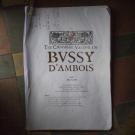

























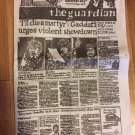
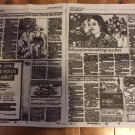







































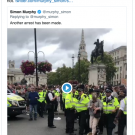






























Proof, in pictures and words, that David Bowie is the TS Eliot of our time
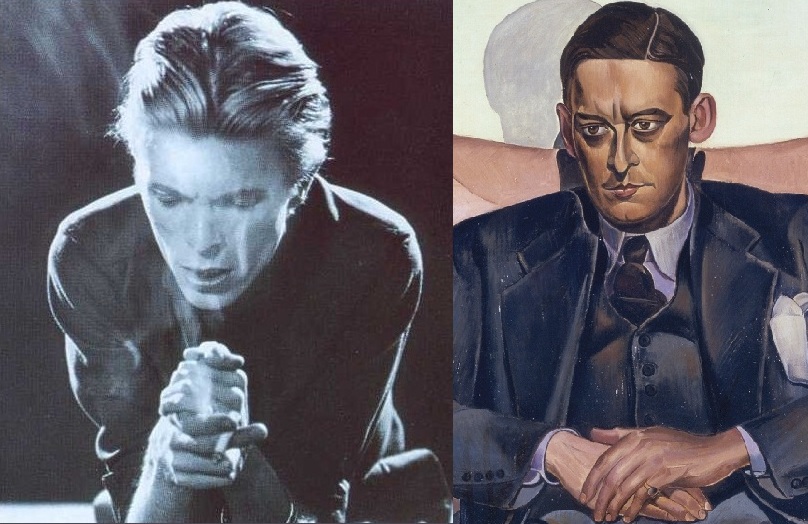
Fragmented language, Nietzschean elitism, and disillusionment with art: could Low have been inspired by The Waste Land?
Both ground-breaking in their respective fields, they antagonised readers and listeners with obscure references and unusual structures. Eliot and Bowie showed similar signs of frustration with their contemporaries, but the two have only rarely been linked to one another.
In a 1974 interview between Bowie and William S. Burroughs, himself a devotee of Eliot’s cut-up style, the following exchange took place:
Burroughs: I read this ‘Eight Line Poem’ of yours and it is very reminiscent of T.S. Eliot.
Bowie: Never read him.
Burroughs: (Laughs) It is very reminiscent of ‘The Waste Land.’
Bowie considered Burroughs to be ‘the John the Baptist of postmodernism,’ so it appears likely that he would have followed up on this. Three years later, Low was released.
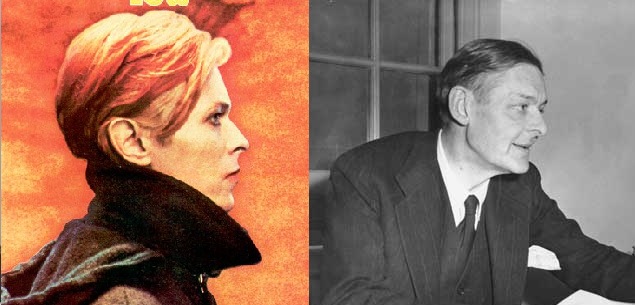
Both early Eliot and Bowie’s Thin White Duke persona were interested in literature, mysticism and the occult, and both entertained a quasi-Nietzschean intellectual elitism coupled with ostensibly conservative views. Nervous and eccentric behaviour is another point in common: Eliot occasionally wore green face powder and demanded to be called ‘Captain,’ and you’ve probably heard the rumours about Bowie preserving his urine in the fridge to avoid being cloned by aliens.
The TWD’s fashion sense also seems to be modelled on Eliot’s dandyish appearance: pale, thin, with slicked-back hair, austere monochromatic clothes, a fedora hat and black overcoat.
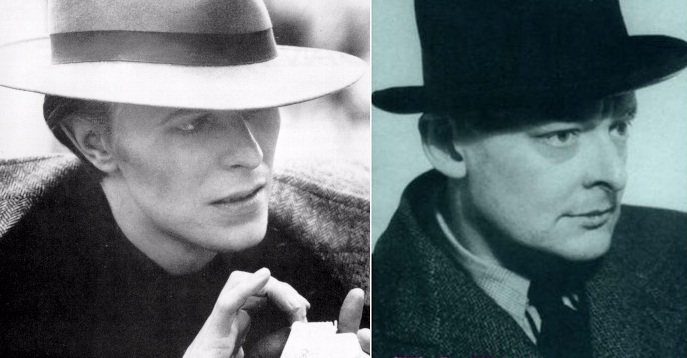
Both works were composed in volatile political times, and Eliot’s and Bowie’s psychological conditions were far from stable. Outer and inner worlds became increasingly difficult to express through language: both felt a distrust of semiotics, lamenting the impossibility of precise utterance, so their work became increasingly non-linguistic. Eliot concentrated on the poem’s visual and spatial elements, bringing attention to the form. Similarly, Low is mainly instrumental, and the few lyrics are enigmatic. Both subverted expectations, drawing attention to the artifice, and form began to merge with content.
The artists both challenge the idea of a single, fixed identity: they hide their own personality by giving a voice to numerous different characters. The Waste Land, originally entitled ‘He Do the Police in Different Voices,’ provided an outlet to the thoughts and speech of characters within the personality of Eliot. Bowie, known for his chameleonic alter-egos Ziggy Stardust and Aladdin Sane, in the guise of the Thin White Duke splits even further: ‘Be My Wife’ is sung in a theatrical cockney accent, ‘Warszawa’ suggests someone from Eastern Europe, and ‘Breaking Glass’ is performed in a terse, unemotional voice. The juxtaposition of speakers undermines the idea of one central voice or of one correct meaning: we are never sure who the ‘real’ Bowie or Eliot is.

Perhaps counterintuitively, Eliot and Bowie both allude extensively to traditional forms of their particular art in their attempt to modernise themselves: Eliot refers to Chaucer and Baudelaire, and Bowie alludes to old-fashioned and foreign music including chanting, harmonicas, ragtime riffs and saxophones. These are then set against modern techniques: Eliot’s untraditional versification is at odds with the classical poets he references, and Bowie’s synthesiser sounds especially futuristic when contrasted to ragtime piano jingles.
Both works, bringing to light the impossibility of originality, are characterised not by an intrinsic ‘newness’, but by a Modernist yearning for the new. And this, I would argue, is what makes both works so innovative: they seem to admit that they do not operate in a cultural vacuum, and that they are not – and cannot be – original.
Still not convinced? Here are 4400 more words on the subject, with references and research and stuff, based on an essay I wrote in 2009.
Follow Kathryn on Twitter @kathryn42 and check out her blog London Scrawling.
See also:
In-depth interview: Flash fiction publisher Holly Clarke explains how a 60-word story can still mean something
Read ‘the worst poet ever’ William McGonagall’s terrible poem about London
11 Jan 2013



















































































































One Minute With Bethan Clark of Olga's Room
We wanted to do Olga’s Room because…
…Speaking in Tongues aims to share little known European plays with English speaking audiences in Britain and across the continent. We commissioned the translation of Olga’s Room, from the original German, which focuses on the life of Olga Benario, a 1930s communist, Jewish, freedom fighter. She was a bodyguard to Louis Prestes, a rebel leader of the 1920s opposing the dictatorship of Getúlio Vargas in Brazil and, on a mission to overthrow the dictator, was captured and imprisoned in Brazil and later Germany.
The play tells her struggle for survival as she clings to her disintegrating sense of self, although rather then being intended as an homage, it explores the reality of a woman who had an astonishing but agonisingly complex life. As an actress it’s great to play a woman of such depth. We premiered in Luxembourg City and are delighted to be bringing it to the Arcola for its UK premiere.
We want people who see our work to…
…talk about it afterwards – if it makes people discuss, question or comment on what they have just seen then we’ve succeeded in having an impact beyond a simple engagement of sitting down and watching a play, then leaving and saying ‘ that was alright’.
I was drawn to theatre because…
…there is a shared experience between performer and the audience in a live environment, plus, there is a delightful danger in it. Every performance is different, every audience is different and I like that constant shifting dynamic.

The best thing about my job is…
…Having the opportunity to do different projects and collaborate with many different people. The specific benefit of running our own theatre company is being able to work on projects such as Olga’s Room and involving a team of people to make work we are proud of.
The works that inspire me are…
…works that are human. I mean that in the sense that there is an honesty, which is not necessarily always pleasurable to experience but is true. From comedy to tragedy: seeing the soul of something that inspires me.
You must go and see…
…Julius Caesar at the Donmar, I enjoyed seeing an all female take on this classic production. My training has included the MA in European Classical Acting at Drama Centre and I am always keen on seeing or being involved in interpretations of classical texts that appeal to modern audiences. Having a high profile director and venue doing an all female cast raises the debate about the position of women in the industry as a whole, and as a woman in the profession this issue is important to me.

The best advice I ever got was…
…be yourself and don’t judge others.
The best advice I can give is…
…it is better to try and fail than never to try for fear of failing.
The thing I love most about theatre in London…
…is the variety of theatre that exists, particularly on the Fringe because there is a vast choice of style, content and venues all fed with a passion for the work.
The thing I hate most about theatre in London is…
…once you are older than 25 subsidised cheaper ticket schemes stop, I didn’t hit 25 and was suddenly able to afford the theatre! Would be nice to see no age limit and there always being affordable ticket options whatever age you are and regardless of whether you are member of a group.
It’s my last day on earth so I will…
…spend it with my family and friends…..ideally there would also be cocktail drinking involved.
10 Jan 2013
Boris Johnson to close 65 police stations to public
Boris Johnson plans to close 65 of London’s police stations to the public under proposals released today.
The following stations will lose their front counters:
Barking and Dagenham
MARKS GATE POLICE OFFICE
DAGENHAM POLICE STATION
BARKING POLICE STATION
Barnet
WHETSTONE POLICE STATION
BARNET POLICE STATION
Bexley
BELVEDERE POLICE STATION
Brent
HARLESDEN POLICE STATION
WILLESDEN GREEN POLICE STATION
Bromley
BIGGIN HILL AIRPORT
ORPINGTON POLICE STATION
Camden
WEST HAMPSTEAD POLICE STATION
ALBANY STREET POLICE STATION
HAMPSTEAD POLICE STATION
Croydon
PURLEY, WHYTECLIFFE ROAD SOUTH 9 & 11
KENLEY POLICE STATION
ADDINGTON POLICE STATION
NORBURY POLICE STATION
SOUTH NORWOOD POLICE STATION
Ealing
GREENFORD POLICE STATION
Enfield
SOUTHGATE POLICE STATION
WINCHMORE HILL POLICE STATION
Greenwich
THAMESMEAD, JOYCE DAWSON WAY 11
GREENWICH POLICE STATION
WOOLWICH POLICE STATION
Hackney
HACKNEY POLICE STATION
Hammersmith and Fulham
SHEPHERDS BUSH POLICE STATION
Haringey
MUSWELL HILL POLICE STATION
Harrow
CIVIC CENTRE HARROW
PINNER POLICE STATION
Havering
RAINHAM POLICE OFFICE
HAVERING PASC
STRAIGHT ROAD 84-86
HORNCHURCH POLICE STATION
Hillingdon
NORTHWOOD POLICE OFFICE
Hounslow
FELTHAM POLICE STATION
BRENTFORD POLICE STATION
Kensington and Chelsea
CHELSEA POLICE STATION
Kingston upon Thames
MILLBANK HOUSE GROUND FLOOR NORTH
Lambeth
CAVENDISH ROAD POLICE STATION
CLAPHAM POLICE STATION
GIPSY HILL POLICE STATION
Lewisham
BROCKLEY POLICE STATION
SYDENHAM POLICE STATION
Merton
MORDEN POLICE OFFICE 3 CROWN PARADE
TOOTING POLICE STATION & FORMER SECTION HOUSE
Newham
NORTH WOOLWICH POLICE STATION
STRATFORD POLICE STATION
Redbridge
WANSTEAD POLICE STATION
WOODFORD POLICE STATION
Southwark
CAMBERWELL POLICE STATION
EAST DULWICH POLICE STATION (NEW)
ROTHERHITHE POLICE STATION
Sutton
CROSSPOINT HOUSE PART GND & FIRST FLOORS
Tower Hamlets
BOW POLICE STATION
ISLE OF DOGS POLICE STATION
POPLAR POLICE OFFICE
Waltham Forest
WALTHAMSTOW TOWN CENTRE OFFICE SNU
WALTHAMSTOW POLICE STATION
LEYTON POLICE STATION
Wandsworth
JUBILEE HOUSE PUTNEY
BATTERSEA POLICE STATION
Westminster
HARROW ROAD POLICE STATION
ST JONH’S WOOD POLICE STATION & FORMER SECTION HOUSE
MARYLEBONE POLICE STATION & FORMER SECTION HOUSE
Islington and Richmond Upon Thames will retain all of their existing front counters, although Holloway Police Station will no longer be open 24 hours.
Dozens of others will no longer open 24 hours a day. New “pop up” counters are planned in supermarkets, coffee shops and post offices.
You can read the full plans here.
09 Jan 2013
Christian Wolmar attacks plans for third Blackwall Tunnel
Leading transport commentator Christian Wolmar has come out against plans by Boris Johnson and Labour councils to build a third Blackwall Tunnel at Silvertown.
Wolmar, who is standing to become Mayor of London in 2016, said that he “cannot support” the tunnel because it would “lead to more congestion not less.”
He told The Scoop:
“I like the idea of a ferry but cannot support a road tunnel. It would undoubtedly lead to more congestion not less. The oversize problem should be dealt with through better management of the tunnel.”
He also told a meeting last night that he would “have a word” with those in the Labour party backing the plan.
Wolmar’s intervention exposes a deep rift amongst members of the London Labour party over their support for a new road tunnel between Silvertown and the Greenwich Peninsula.
Labour councils in Greenwich and Newham officially support Boris’s plan, but many local activists and leading figures in the party do not.
The chair of Greenwich Labour Party David Gardner has already signed an online petition against the plans saying that it would be “bad for air quality, bad for CO2 emissions [and] bad for people’s health.”
Former Mayor of London Ken Livingstone has also criticised the plans.
He told The Scoop during his last campaign to be mayor that it would be “mad” to “dump all that extra traffic in the area around the Greenwich Peninsula.”
The leadership of Newham Council are also thought to be divided over the issue.
Although they officially support a new tunnel, they have told Transport for London that their support is conditional on a new road bridge also being built at Gallions Reach.
TfL have no plans to do so in either the short or medium term.
The launch of Greenwich and Newham’s campaign for two new road crossings across the Thames was hijacked by environmental campaigners last week.
Greenwich Councillor Denise Hyland admitted that they had done no studies into the impact of their plans on traffic and pollution levels before launching their campaign.
TfL are currently consulting over the proposals. There is also a petition against the Silvertown Tunnel here.
09 Jan 2013
MPFree: Music Finland @ Eurosonic 2013
Music Finland has released a mixtape in advance of this weekend’s Eurosonic Nooderslag 2013, featuring those Finnish acts performing at the festival in Groningen, Netherlands. Amongst the tracks is a free download from the much touted Phantom (pictured).
We’re outrageously jealous of those able to attend this year’s Eurosonic, but this mixtape has soothed the pain somewhat, so thank you Music Finland.
08 Jan 2013
Honey by Torres
Neatly sidestepping the obvious here soccer fans, this track from Nashville’s Torres, aka 22-year-old Mackenzie Scott, has been working its way through the blogs like fellow Tennesseans Kings of Leon through a remote girl’s public school dorm. Justifiably so: It is, as one Youtube user emphatically states, ‘absolutely devastating’, a shining advert for the virtues of the me ‘n’ my guitar ethos; PJ Harvey at her bluesy rawest before she adopted the persona of a disgruntled May Queen – with added gospel introspection.
Torres’ self-titled, self-released debut is out January 22. Pre-order here.
07 Jan 2013



















































































































"My only hope is that some voter in Brixton Hill doesn't do a Google search and end up on this thread."
What’s London’s first big political battle of 2013? It’s only the Brixton Hill by-election, isn’t it?
Former Lambeth Council leader Steve Reed is now the Labour MP for Croydon North, so after his by-election win, another by-election must be held to fill his old post at Lambeth.
After Reed’s Big Society-esque “co-operative council” put several noses out of joint down Lambeth way, you’d expect a determined challenge from the left. Step forward the Socialist Party of Great Britain, which has put forward candidate Danny Lambert to fight the poll on 17 January.
So, what healthy debates can we find on the party’s website
“I hope the SPGB does use a candidate photo.”
“Goodness me! That would mean breaking with tradition…..”
“It’s not a popularity or beauty contest but a gauge of socialist consciousness and a measure of our own effectiveness as a party.”
“No personalities, just Socialism.”
“I couldn’t give a flying fuck what other parties’ candidates do; they can show pictures of their arses for all I care.”
“There is no ban on obscenities. If you think such words should be censored you are free to bring a resolution to conference via your branch.”
“Bad news, you fucking prick, I have withdrawn my resignation and I am keeping an eye on you.”
“Personally, I would rather be called a prick right out in the open, than be nibbled away at by underhanded abuse, akin to bein nibbled to death by rats.”
“My only hope is that some voter in Brixton Hill doesn’t do a Google search and end up on this thread.”
Ooops. Too late, Comrades.
If you do want to see what Danny Lambert and the other candidates look like, then the excellent Brixton Blog is holding a hustings this Thursday.
07 Jan 2013



















































































































Analyse this: why is the idea of a cat cafe so popular with Londoners?
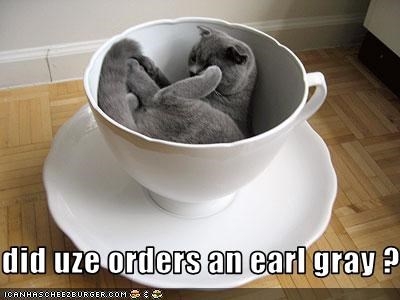
This week, as if 2013 had made a new year’s resolution of itself – the resolution being to be more about cats – came news of a proposed “cat cafe” at which Londoners would be able to buy tea, coffee and cakes, and to hire the services of a pliant mog.
This idea has proved wildly popular. At the time of writing, the cafe’s crowdfunding page has two and a half thousand Facebook Likes and has raised over £5000. Commenters there seem genuinely excited, moved even, by the notion of drinking in a cafe of cats.
Why is this? How can we explain the strength, and the depth, of this collective response? Here are some theories.
1. It’s an extension of the “generation rent” thing
It is, on reflection, entirely understandable that a generation of humans who are compelled to rent their homes by the month and their cars by the hour should think it natural to rent their pets as well. For one thing, as renters, many cannot keep a cat of their own. For another, ownership itself is an increasingly old-fashioned conceit. This is the baby boomers’ cultural bequest to their children: that permanence be for the old, the wealthy, and the dead. Our lives are but sequential experiences, to be paid for by the hour. The cat experience is just another to add to the bucket list.
2. The monetising of cats is the logical end point of our hyper-consumerist society
Renting a cat for pleasure is, when you think about it, a deeply shocking act. A cat cafe is just one well-constructed pussy joke away from being a cat brothel. The cats there being pimped out will cease to be cats. They will become commodities, and their objectification is an inevitable result. The fluffy ones and the purrers will be feted and loved; the scratchers and the scrawners sidelined and shunned. In a world where everything can be bought and sold, rented and loaned, why should cats escape the stroke of the market’s invisible hand?
3. People don’t love the idea of the cat cafe. They love the idea of the idea of the cat cafe
The cafe’s crowdfunding page has 2.5k Facebook Likes, and about 200 funders, who have chipped in anything from £5 for a pat to £130 for a year’s membership. 200 donors is a good number, but set against the thousands of Likes the story has gathered across the sites where it has been aired, one thing is very clear. People may like the idea of a cat cafe, but they like the idea of the idea of a cat cafe a whole lot more. Publically Liking a story about a cat cafe is a way of showing that you are the sort of person who likes the idea of a cat cafe. The popularity of the proposed cafe comes not from the cafe itself, which few of the Likers will ever visit, but in the opportunity it gives them to signal and affirm their preferences to their friends. It is, in that sense, primarily a virtual success.
4. The internet is a feline medium, and this a feline age
The final triumph of cats over dogs is now upon us. The power which the ancient Egyptians recognised in the cats’ sly eyes and prowling movements was supplanted in time by canine usefulness. For three thousand years dogs were just more use to us than cats: dogs guarded the homes of the weak, caught food for the hungry, and comforted the bereft. Cats caught the occasional rat. An unequal contribution. But now we have no need of assistance from the hounds. Now the dogs’ loyalty is boring. What we need is to be surprised and entertained. And so the numinous felines reassert themselves. They have conquered our internet, and are now at the gates of our city itself. There will never be a dog cafe, because the performance of the dogs would be a certain bet. People will pay for a cat cafe precisely because the cats might withold their delights. And the cats know it.
5. Cats are just really cool
Well they are.
04 Jan 2013



















































































































Reviewing London's culture in 2012: an incoherent babble. More of same expected in 2013
Jasper Rees, at The Arts Desk, has a fine summation of the cultural year just gone. What was London coming out with in 2012?
His verdict (I paraphrase): an incoherent babble.
The most effective, or at least the most popular, piece of public art was the least challenging: the Olympic torch relay. Aside from that, a deluge, but little sense.
Rees finds order in the exhibitions of the big old institutions, the British Library and British Museum.
“It was in the great museums where it was possible to discern a lasting statement, a narrative palimpsest taking the measure of Britishness.”
A conservative analysis then, but a powerful one. There’s an awful lot happening on the fringes of London’s art and cultural scene, away from the attention which the great institutions command. But how much of this activity will have any lasting significance?
This contest, between the established and the unknown, was dramatised in one of the most attention-grabbing incidents of 2012 – the Yellowist defacement of a Rothko painting at the Tate Modern.
Vladimir Umanets signed his name and the words “a potential piece of yellowism” on the painting.
Here was the avant garde, or what passes for it, making a direct physical assault on the galleries from which their art is excluded. In its selection of target it was a vibrant act, but in that sense alone. For yellowism is, or was, utterly bankrupt.
Umanets:
“The main difference between yellowism and art is that in art you have got freedom of interpretation. In yellowism you don’t have freedom of interpretation, everything is about yellowism, that’s it.”
What “everything is about yellowism” really meant is that yellowism was about yellowism, and nothing more (the movement’s manifesto builds upon this depressing theme.) This made it coherent, boring, and thoroughly insignificant. Perhaps in 2012, as Rees suggests, the big galleries just had better things to say.
Looking ahead to 2013, we must hope that the grand institutions retain their excellence. Elsewhere, more cultural incoherence may be just what we need. An indistinct babble is exactly the sort of noise a diverse and vibrant city should be setting out to make. Someone, somewhere, must be saying something worth leaning in to listen to.
Link
The Arts Desk – London 2012 and Beyond – The Best of 2012
02 Jan 2013
Pulp unveil James Murphy collaboration
The great thing about the relatively recent spate of Britpop reformations is the realisation that many of these bands remain potent live – Blur and Pulp I can attest to personally, Suede too by all accounts. The threat of ‘new material’ is, as always, greeted with a chorus of hoorays and groans in equal measure and what little has surfaced has been predictably lacklustre – Blur’s rather spiritless Fool’s Day for example.
Pulp – ever the clever clogs and unashamedly danceable at their core – may have pulled off a masterstroke however, with this cleverly nurtured collaboration with James Murphy. This re-working of an old demo is classic Pulp with a hint of Blondie-esque disco. All other bands with ‘unfinished business’ take note: if you can’t train your podgy middle-aged fingers to make a record as gob-smackingly fresh and excellent as this then you really shouldn’t bother. Really.
31 Dec 2012
Snipe Highlights
Some popular articles from past years
- Punk brewery just as sexist and homophobic as the industry they rail against
- London has chosen its mayor, but why can’t it choose its own media?
- Summer Camp: Roll out those lazy, hazy, crazy days
- Only 16 commuters touch in to Emirates Air Line, figures reveal
- The five spookiest abandoned London hospitals
- Number of people using Thames cable car plunges
- Margaret Thatcher statue rejected by public
- The five best places in London to have an epiphany
- Peter Bayley has worked for 50 years as a cinema projectionist in East Finchley
- A unique collection of photos of Edwardian Londoners
© 2009-2025 Snipe London.
